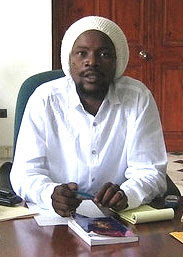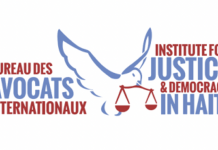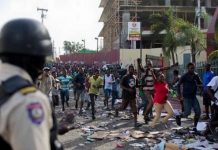
Named after the first slave to revolt against French colonial rule, Samba Boukman – born Jean Baptiste Jean Philippe at an elite neighborhood of Haiti’s capital Port-au-Prince – sees his own destiny in his name. Boukman lost his father at age 13, braved hardship to finish his schooling and became an influential political militant. With the signature rasta hat and and the constitution of Haiti as part of his daily apparel, Boukman was elected spokesperson for the base community associations of the largest department of the nation. “They thought I was a good speaker, that my language was not violent,” Boukman says.
Samba Boukman’s relationship with Bel Air, a shanty town at Port-au-Prince, began in 1995. A member of the Lavalas movement that lead former president of Haiti Jean-Bertrand Aristide to power with strong support among the people Samba Boukman confirms the existence of an armed sector in the movement but justifies its emergence as a response to the violent attacks of its opponents.
Despite recognizing the motivation [that] lead [some in] Lavalas to take up arms, Boukman president of the National Commission for Disarmament, Demobilization and Reintegration [CNDDR or DDR], denies involvement in any violent confrontation, explaining: “I was my mother’s only source of income, and had to stay alive for her sake.”
Once arrested by the United Nations Stabilization Mission in Haiti, the Minustah, Boukman eventually became a partner. He has been a protagonist of the historic mediation that helping usher in the Pact for Peace among violent groups in Bel Air. “There is one condition: zero violence,”Boukman stresses.
Could you tell us a bit about your life?
My father died when I was 13. My mother made a great effort to make sure my three brothers and I went to school. Despite all the difficulties and of having a home without my father I was able to complete my schooling at the age of 22, this was during the embargo when Aristide was in exile and the nation was under a military regime. Gas prices rose so sharply as a result of the embargo that it was impossible to purchase bus tickets and I had to walk kilometers on foot. I began my studies at the National Institute of Administration but had to leave it – dropping out for financial reasons. In 1997 I decided to go back to studying, this time at the School of Law and Economics at Port-au-Prince. Poor people in my country do not have the right to justice. I used to think that only as a lawyer could I help those in need. Like the Dr. Lafontant Joseph a champion of the poor, and who was murdered that reason. Like him, I wanted to help the poor through the Justice system.
When did you become a militant?
I was involved in political militancy very early because from a very young age I would tag along with my mother to her labor union meetings in the 1980’s. She did not speak French and I would translate papers for her. When she fell ill I wanted to become a lawyer to champion the rights of workers. In the 1990’s I was invited by residents in Bel Air to join the political associations that called for the return of President Aristide from exile in the United States of America, but I never took an active interest because I had heard of Bel Air as a dangerous place. Later, in 1995, I decided take part in the René Préval’s campaign (current president of Haiti) and that is how I began to go to Bel Air.
How was Bel Air dangerous?
After the coup d’état of 1991 a great many massacres took place in Bel Air. The army killed many young men. Many of them disappeared as victims of political persecution. At this time the mobilization for the return of President Aristide was born.
Were you afraid?
I was very afraid. Back then I was a clandestine militant. After Préval’s election I had lost my job and became a composer. I began the I and I band. We had another tense political period when a branch, which by the way, had every right to do it, – began to hold manifestations against Aristide, this was during his second term in office, in the year 2000. Regretfully, this group chose the path of violence to fight the Lavalas sector, which I belonged to.
What was this group made up of?
By a number of groups, the 184, the private sector and other groups.
What was your opinion of the Aristide government at the time?
Well, at the time the opposition said that the Aristide government was uniformly Lavalas the entire government was Lavalas. There was no other political trend at the time. They wanted a government that was more of a coalition, but at the time 100% of the population had voted pro Lavalas movement. In any case, the opposition could have found a peaceful way of expressing itself instead of destroying police stations and killing militants. This resulted in the birth of the armed faction of the Lavalas movement.
How did the Lavalas militants have access to guns?
I don’t know. Both Cité Soleil and Bel Air were bases for other militants too. There were people who also fought against the Lavalas. There were infiltrated agents of other political groups among us.
How do you explain these infiltrations?
Many in Cité Soleil and Bel Air had guns because they worked as security professionals for private businesses. These people were, in principle, anti-Lavalas. But later even Lavalas began to take these jobs to get some cash and, at the same time, used these guns to fight the armed opposition. They were what we call double agents, do you understand the problem?
How did this confrontation take place?
The opposition began by organizing peaceful demonstrations. But there was a hard line group made up of former members of the military who were part of this opposition. This is where the double agents come in, who would combat this hard line group with the very same weapons they had been given to guard private enterprises. This caused violent clashes.
What was your position? What was your life like?
I was Lavalas. I used to go to Bel Air, I studied at the National School of Arts. I fell in love with a woman from Bel Air and had two children with her. I was also part of the Organization for the Defense of the Rasta Rights (OPDDR). At the time the people who wanted to grow dreadlocks were not respected. I took part of a few demonstrations but avoided dangerous situations. I was my mother’s only source of income, and had to stay alive for her sake.
Did you not take part in armed struggle?
Never. But when the activities of the opposition began, I went to Bel Air to fight against a coup that was being prepared by the GNB, a movement made up of young students who helped to depose President Aristide in 2004. Many people were dying, there were many clashes between Lavalas groups and the GNB. Aristide was forced to leave the nation.
The army forces had been deactivated by Aristide. What happened to the former members of the military?
The former members of the military (Swat team members) would come in dressed in black and kill many people in Bel Air. They burned down houses. At times they even counted with the support of UN solders who provided coverage so that these people could enter the neighborhoods to kill.
Do you believe the soldiers were conscious of this?
We felt it on our own skins. There were Chinese UNPOL [MINUSTAH police] and Brazilian soldiers who provided coverage for those responsible for the operations. But after a while, the commander of the Brazilian battalion realized that when the battalion positioned itself on the main streets, the police dressed in black would enter through the side streets and kill innocent people. So they then started to accompany them into these alleyways and it was only then that the population felt relieved.
When the press arrived, people denounced these violations. It was at that point that I was elected the spokesman for all the small associations of the Department of the West (the largest in Haiti, where Port-au-Prince is located). They believed that I spoke well, that my language was not violent. But I did not want to speak, I was afraid that they would hear me speak and go to Pétion village and kill my mother. But with the pressure of the people, I decided to accept. It was then that I came into contact with members of the
Aristide Foundation and started to also represent the Lavalas.
You did not agree with this violent faction, yet you accepted to represent them as their spokesperson?
It was the base community associations who chose me as a spokesperson, but they were never armed. Do not forget, however…that 750 policemen and security men had been laid off from their jobs as civil servants and left with all these guns in their hands. They had been fired they were Lavalas. They could not simply cross their arms and wait to be killed. They had guns and they used them.
What was your function?
My function was to administer the interests of Lavalas and to take firm decisions in relation to the base organizations. The international community would only listen to us if we conducted peaceful demonstrations. But our first demonstration in Bel Air held November 10th, 2004, ended badly. The men in black shot at us. I escaped narrowly, but I saw people die right in front of me, boys and girls, all of them young.
And the UN soldiers?
After many demonstrations we were managed to open up dialogue with them. We negotiated with the both the military command and the civil sector of Minustah with the intention of convincing them that we were not all the same. The Minustah then proposed the program of Demobilization, Disarmament and Reintegration (DDR). The disarmament was beneficial to the Lavalas militants. The social activities in the neighborhood were an encouragement for young people with guns to join the process. The civil sector of the UN and the Zakat Zanfan Organization (an organization that works with street children in Haiti) promoted social activities and helped raise awareness of the needs of street children who were under the watch of the police because there were armed and were Lavalas.
But there are no doors open in the DDR for gangs, and the day that this happens I will submit my resignation. The DDR was implemented for young militants who used weapons to defend themselves from repression. Not for those behind kidnappings or murders. About 20 children have already joined the program voluntarily and turned in their guns, despite the difficulties. Many benefited from the program by attending schools and courses in mechanics, carpentry and computing.
Is Bel Air fully disarmed?
At this precise moment we do not have firearms in Bel Air. Everyone is vigilant about keeping the neighborhood peaceful. And this also allowed the Minustah to open an electoral zone in the area.
Is it true that you were taken prisoner by Minustah?
Yes, in February of 2005. During that time, the Minustah believed that all the inhabitants of the neighborhood were bandits. I took a long time to react and I was imprisoned. They took me to the University of Tabarre and conducted an investigation based on my last name, which is Jean Baptiste Jean Philippe. They did not find anything, of course. But when they announced on the radio that Samba Boukman had been imprisoned, the police reacted and asked to take me under their custody. The Brazilian military forces refused, saying that it was too late, and released me the next day in Bel Air.
So you then decided to continue living in Bel Air?
I never left the neighborhood. I have my wife and children living there and I did not want to abandon the people of Bel Air who had put so much confidence in me. Before the elections and with the help of the Minustah, we had successfully pacified the area. We were able to do without violent police operations, and thanks to dialogue we found solutions. After the elections, the legitimate government established the National Commission of Disarmament, the CNDDR, and I was chosen to head the commission.
Any gang members who didn’t want to turn in their firearms were forced to move out of Bel Air, into neighborhoods where they were tolerated. Those who didn’t leave the neighborhood were victimized by the people. Others turned in their firearms to the police. With peace installed in Bel Air, the Minustah was able to carry out two major garbage retrieval drives and we have had the opportunity to work with a valuable partner, –
Viva Rio – responsible for implementing projects to help in Fort Touron, Delmas 2 and Solino.
Do you think that Pact for Peace, signed in May by the gang leaders and the CNDDR will be maintained?
The Pact for Peace resulted from meetings held by members of the administration committee implemented by Viva Rio at the CNDDR and the community. It was signed especially by those involved in conflicts, faction leaders who would lead clashes among the four zones of the Bel Air neighborhood, (Solino, Delmas, Bel Air e Fort Touron). There is no mandate against these people, but they have the support of the people in their immediate vicinity. We were forced to go through them to manage the conflict. And there is a condition: zero violence. As things now stand, episodes of violence will cancel any financial aid for students. Our biggest problem is education. Now, if there is violence, the population will revolt against those who stop their children from studying and could even commit acts of violence that are not good for the image of our judicial system. The pact will bring many results and may even be reproduced in other neighborhoods.
Translated by Katayoun Shahrokhi and Lis Horta Moriconi
This article was originally posted on the now defunct web-site of Comunidade Segura.






